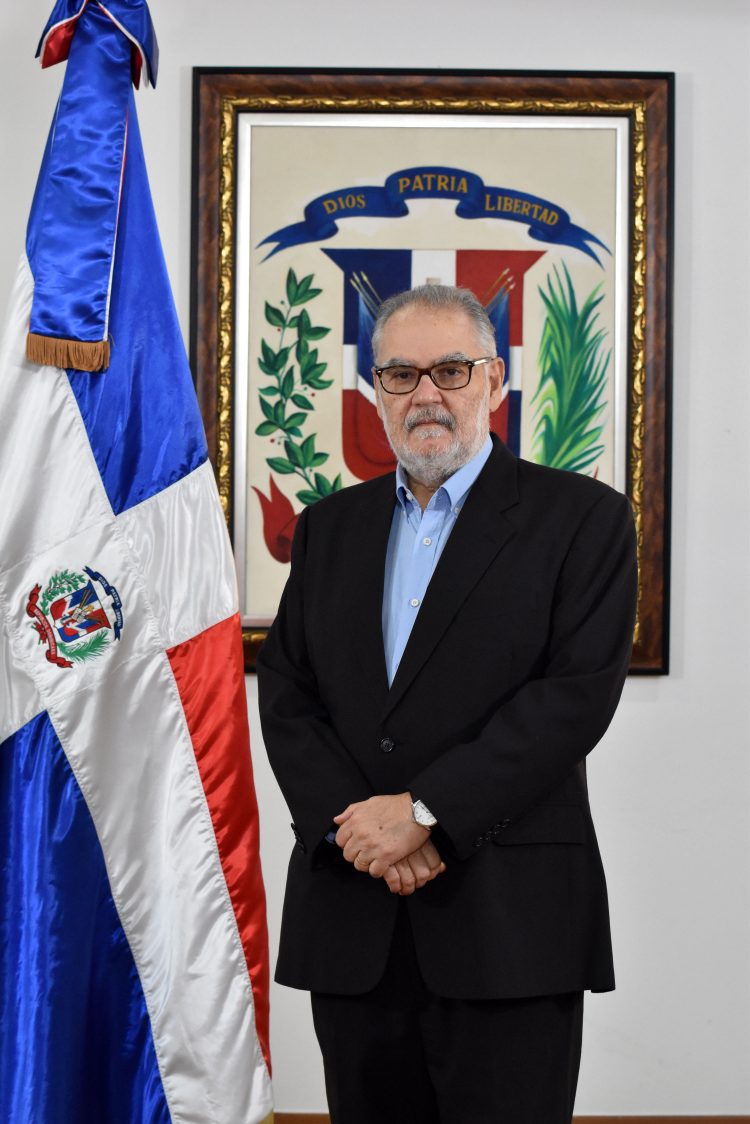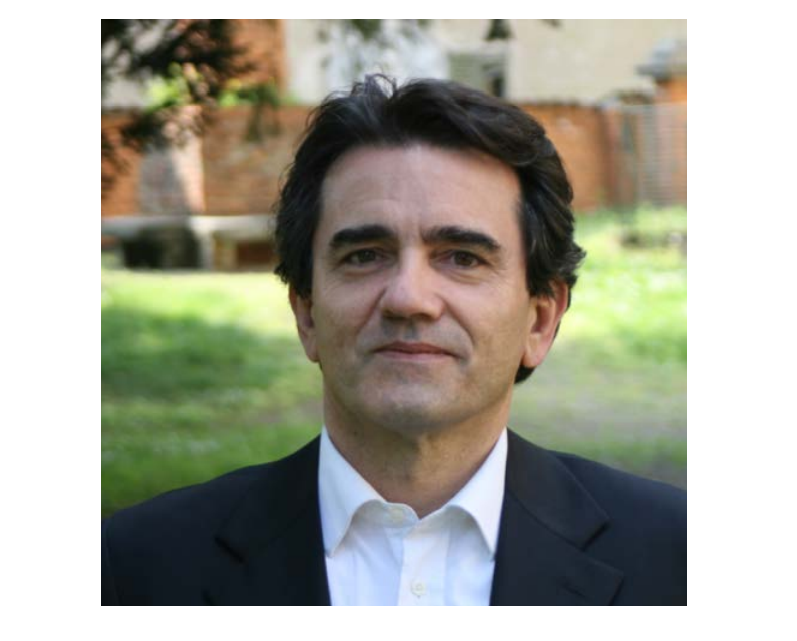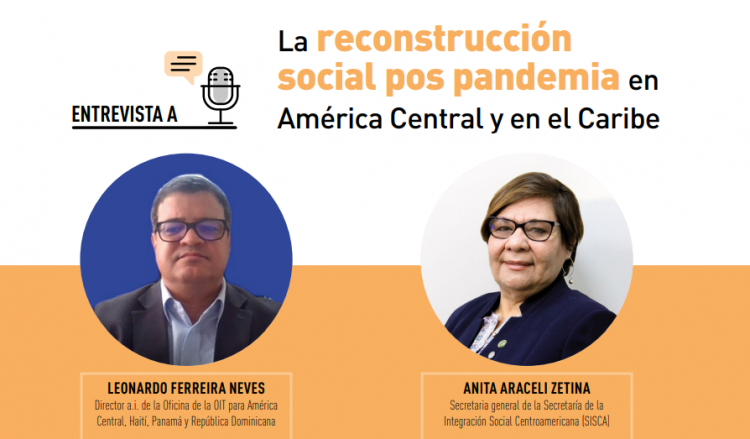Recíprocamente interviewed Alfredo Suárez Mieses, Secretary General of the Secretariat for Central American Social Integration, in which he tells us how the crisis has been experienced and what the future prospects are for the Central American region.

“Solutions proposed from an exclusively national perspective will not have favourable results in the medium-long term”
The health emergency caused by COVID-19 has shone a light on weaknesses that, to varying degrees, were already present in almost all SICA (Central American Integration System) countries: weak social protection systems, largely informal labour markets and low investment in health, among others. Do you think that the current crisis has contributed to generating a reflection at the regional level on structural responses to these problems and towards a greater role for public policies to face these gaps?
Alfredo Suárez: In the first place, we must take account of the fact that this crisis has exposed the social gaps that have historically characterised the SICA region, comprising the seven Central American countries plus the Dominican Republic. It must also be borne in mind that before the crisis, the region was already going through a time of great weakness and vulnerability at the macroeconomic level. Several of the countries had worrying debt levels, which greatly constrained their ability to implement fiscal policies — it has been estimated that the reduction in average GDP for the SICA countries will be around 7.3% or 8% approximately. On top of all this, due to the decline in economic activity, these countries’ revenues have been reduced, thus further limiting governments’ already tight room for manoeuvre.
Once the crisis arrived, the countries had to take very quick measures to contain the epidemic, especially at the health level. In that first moment, countries such as Costa Rica and the Dominican Republic, which have much more consolidated social protection systems than the rest and with better coordinated public sector intervention, had more capacity to respond in the short term. We can, thus, say that the existing social policies, based on a territorial planning dynamic, made it possible to reduce the negative effects of the COVID-19 crisis. Apart from this, the SICA countries announced packages of fiscal measures to face the health emergency and mitigate the social and economic damage to some extent. These measures imply a considerable fiscal effort which, on average, ECLAC puts at around 3.9% of the GDP of Latin America and the Caribbean.
Given the situation, the region has intensified dialogue and reflection, showing that problems such as poverty and inequality still require significant effort and substantive changes in how public policy is carried out. Furthermore, as a result of the crisis, it has become more common to reflect on regional strategies to confront situations like this, accepting that solutions proposed from an exclusively national perspective will not have favourable results in the medium-long term. The crisis deriving from the pandemic has also highlighted the importance of multilateralism to combat crises such as these, as well as the need to strengthen integration spaces. As proof of this, debates have been taking place and a wide range of spaces for joint reflection have been developed, some promoted by civil society and others by the integration bodies themselves. The Secretariat for Central American Social Integration (SISCA), with the support of EUROsociAL+ and United Nations agencies, organised a series of web forums among the countries in the region in which we sought to reflect, in an intersectoral manner, on the measures to be taken to confront the crisis and the efforts being made at the country level. This space was, in turn, a means to identify demands from the countries in terms of technical support that could be leveraged from the social area of the Regional Integration System, EUROsociAL+ or other partners.
¿How can we move forward, within a framework that seeks to achieve resilience, so that social issues take on more significance, alongside economic ones, leaving behind their residual weight and their welfare-based character?
Alfredo Suárez: The current context has required a rethinking of different national social programmes to meet the needs of vulnerable groups, both in the immediate phase of the response and in the medium term, to prevent or mitigate the negative economic impacts of the crisis.
In a crisis situation like the current one, social protection is an instrument for protecting the poorest and most vulnerable population, which faces the loss of livelihoods, low availability of income, vulnerability in terms of health and education and, not least, greater food insecurity and even malnutrition. In this regard, ECLAC forecasts increases in the Gini index, which measures income inequality, of between 1.0% and 8.0% for the countries in our region and estimates that the percentage of the population living in poverty will increase, on average, by 4.3% compared with 2019.
The experiences of the countries in relation to the implementation of programmes within the framework of social protection systems show that these are key aspects in the social reconstruction of countries, given their contribution to reducing risk and social and economic vulnerability, as well as in alleviating extreme poverty and deprivation, with an equitable approach sensitive to population differences and inequalities. In this regard, moving towards a more comprehensive social policy, which goes beyond this welfare-based approach, requires the consolidation of social policies under a social protection system, promoting intersectoral coordination within the governments themselves and ensuring a life cycle and rights-based approach, and also seeking to develop policies with a universal character that take into account the inequalities in each country.
¿How did the initiative for the Recovery, Social Reconstruction and Resilience Plan for Central America and the Dominican Republic emerge and what are the expectations of the countries regarding this Plan?
Alfredo Suárez: Last year, at SISCA, with the support of EUROSOCIAL+ and the FAO, we embarked on the process of formulating the Integral Regional Social Policy, an instrument that responds to the mandate of the Central American Council for Social Integration (CIS) and has the support of the heads of state and government of the SICA member countries, to formulate, through a participatory exercise, the SICA Regional Social Policy, with the support of the competent authorities and development partners.
From the point of view of the institutional framework of the Regional Integration System, the SICA Integral Regional Social Policy (PSIR) for 2020-2040 complements and enhances the regional social actions, programmes and projects currently under way, but without losing its medium- and long-term strategic vision or its comprehensiveness.
Once the pandemic arrived, it was decided to extend the process of formulating the PSIR, since consideration needed to be given to whether it was appropriate to incorporate new aspects into the document. And in this context, the CIS issued two declarations, which highlighted the enormous potential for the social integration process to support countries in facing the pandemic, and it also urged SISCA to continue working with partners to formulate the PSIR by reviewing it and incorporate elements derived from the lessons learned during the pandemic.
Given that the policy is a long-term instrument, the CIS calls for the emergency to be addressed by asking SISCA, supported by the EU EUROSOCIAL+ programme and United Nations agencies, to make a start on formulating a regional recovery, social reconstruction and resilience plan for Central America and the Dominican Republic. This plan, which must play a part in contributing to fulfiling the SDGs as well as also helping countries overcome the crisis, has been structured around three lines of work:
The first is social protection, which is the focus of the work by the CIS, advised not only by the EUROsociAL+ programme, but also by the FAO, which will closely accompany the implementation of the projects.
The second addresses employability and employment as an important factor for economic and social reconstruction, which will be accompanied by EUROsociAL+ as well as by the ILO. From the political sphere, it will be led by the council of labour ministers.
Finally, the third strand is urban settlements; which will be undertaken with advice from UN HABITAT and be led by the housing ministers, always with the accompaniment of EUROsociAL+.
It is not the first time that the region has had to face disastrous situations (wars, natural events, etc.) that require the definition and implementation of reconstruction plans. Do you think this could be the occasion to move towards greater regional integration?
Alfredo Suárez: Definitely, yes; the situation and the dynamics make it clear that greater integration and cross-sector interaction are required. At a general level, there is recognition of the potential for multilateralism and the regional integration spaces to contribute to enhancing the recovery processes that the countries undertake. Likewise, there is pressure to favour participation by different actors that can contribute to these integration processes.
The preparation of the reconstruction plan will be a practical exercise on how integration is approached from two routes: from the national to the regional, through the implementation of national social policies converging at the regional level; and from the regional to the national, by implementing integration strategies and ensuring regional cooperation, impacting on national efforts.
Through this plan and with the help of social policies, it is hoped that integration will become a true instrument of regional development; but not only that, it is also hoped that a new vision of integration will be adopted, a broader vision that contributes to legitimising it socially and politically. Furthermore, efforts such as these allow progress towards social integration as the coordinating hub for human development within a process of integration.



